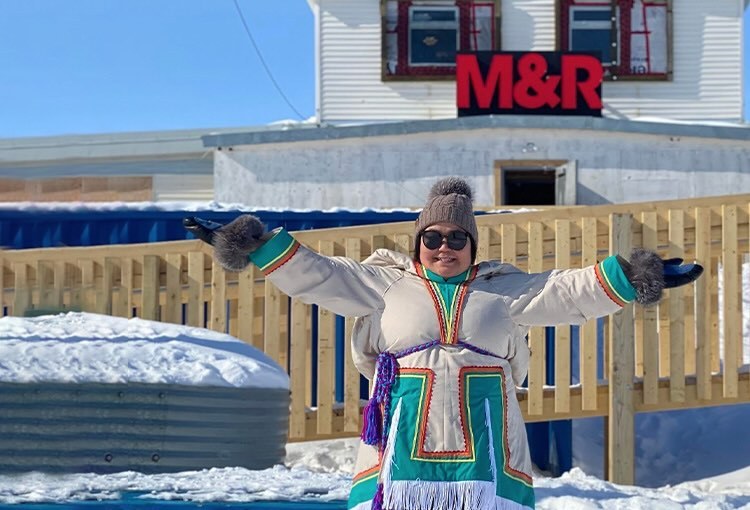Without safe, reliable childcare, the brilliant idea a young mom has for a small business might remain just that — an idea.
The same applies to the skills training, laptops, and wage subsidies that ambitious entrepreneurs in rural or remote Indigenous communities often need to start up a small business.
Without these crucial supports, many businesses in these communities may never get off the ground.
But Ampere, a non-profit organization based in Iqaluit, Nunavut, is actively working to help remove barriers to entrepreneurs’ success.
“We support these communities through STEAM education (science, technology, engineering, arts, and mathematics), digital literacy, and workforce development," said Tanner Big Canoe, Ampere's director of productions.
"We've grown to deliver more than 100,000 programs from coast to coast."
Launching and growing small businesses
Ampere was one of 10 organizations to receive $1-million grants from the 2024 TD Ready Challenge. The TD Ready Challenge is an annual initiative that focuses on non-profit and charitable organizations that are developing innovative, impactful, and measurable solutions to some of society's most challenging problems.
Ampere received a CAD $1M grant to develop its “Amp Up Small Business” program. The Amp Up program aims to help low-income future entrepreneurs in underserved rural, remote, and Indigenous communities across Canada develop, launch, and grow small businesses.
According to Ampere, the Amp Up program is a sustainable and scalable program that can be easily replicated to help support entrepreneurs in communities across the country.
Another piece of the Amp Up program is Amp Incubator, where selected businesses receive support and financial investment from Ampere in exchange for a percentage of revenue to be reinvested in Amp Up programming, said Caitlin Patterson, Ampere's Chief Operating Officer.
"This [Amp Up program] really came about because community members have these passions and skills, but they lack the access to the resources and training to launch their own business operations," she said.
“Removing barriers looks like supporting the whole person, which might include offering free childcare, helping people open bank accounts, serving food during programming, organizing transportation, or even supporting someone to locate a Social Insurance Number."
"These are opportunities for us to support our participants to navigate some of the systems they might not be comfortable or familiar with," she said.
An Ampere success story: Arctic Fresh
Ampere has a track record of success when it comes to offering training and other support for small businesses.
In 2019, the organization started working with Arctic Fresh, an online grocery business based in Iglulik, Nunavut, that connects residents with fresh, affordable food options.
Rhoda Angutimarik, the company's CEO and a former teacher from the Inuit community, started Arctic Fresh with the goal of increasing accessibility to fresh food in the territory, where groceries are extremely expensive.
Ampere worked with Arctic Fresh to support employee upskilling, local computer refurbishment and repair, paid internships for under-employed young people, and wage subsidies.
Now, Arctic Fresh is thriving, said Ward Alsop, Ampere's marketing, communications and outreach manager. They’ve opened a physical grocery store and a cafe for the local community in Iglulik.
The business has also funded the construction of greenhouses in the region, so that community members can learn how to grow produce. Greenhouse-grown plants like tomatoes can be paired with local, traditional food like Arctic Char.
"When we look at how Arctic Fresh has grown, expanded, and created a real meaningful difference in their community, we see precisely the type of sustainable, systemic impact we’re aiming to achieve," Ward said.
Makerspaces for creative experimentation
Ampere's programming isn't just for small business. It also offers programming for school-aged kids looking for skills, mentorship, and community as they prepare to enter the working world.
It runs Makerspaces across Canada, which are community hubs where young people can explore their creativity and experiment with digital tools like 3D printing.
Big Canoe, whose family is from the Chippewas of Georgina Island on Lake Simcoe, now works for Ampere. But he was once a high school student who hung out in Ampere's Makerspace in Lindsay, Ont., to learn about computer science and coding.
"In the Makerspace, sometimes you come in not even knowing what you're going to create. For me, I was into coding," he said.
"Without these spaces, I wouldn't have had the access to the tools and technology to be able to explore these avenues."
Big Canoe went on to study computer science at Queen's University and eventually returned to Ampere as an employee — bringing with him his lived experience as a young person from the Indigenous community who lived off-reserve in a rural area.
“Since coming into the organization, I’ve been able to reconnect with my culture, because all of a sudden I’m serving Indigenous communities, and needing to understand how their culture works, and how [I can] meet them where they are to build products that they feel represented in," he said.
"This is the point of what we're trying to do with all our programs: create spaces across Canada to make things and learn new things in communities where there aren't traditional systems set up for that."
